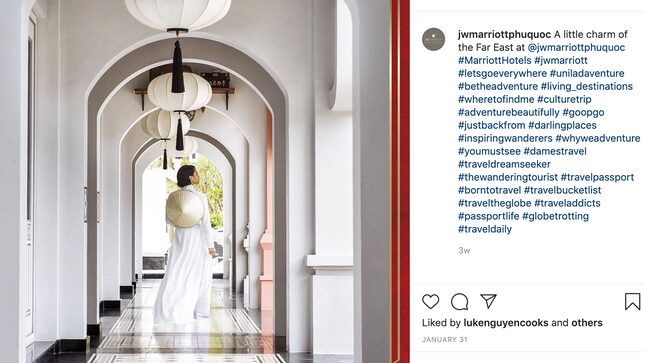Surprise, Luxury Hotels Are Struggling to Rein in Influencers Who Want Everything for Free
Latest

Back in 2018, my colleague Megan Reynolds wrote a blog about the Instagram influencers who routinely bombard luxury resorts with ridiculous requests to finagle their way into free room and board… in exchange for glowing posts, of course. Many of those requests came from people who aren’t even influencers—randos with 2,000 Instagram followers, demanding a fully-comped, week-long stay at a five-star hotel in, like, the Maldives. To counteract the influx of opportunistic “influencers,” or so it seems, some luxury hotels have begun to use formal screening processes to hand-select the social media users who get to stay in their lavish rooms for free. Guess social media celebrities haven’t lost their ability to leech off brands. I say more power to ‘em.
Take, for example, the JW Marriott Phu Quoc Emerald Bay Resort and Spa, one of the top resorts in Southeast Asia. It boasts of $5,000 – $7,000 a night villas during its peak travel season, but offers some more modest, couple-hundred-a-night rooms. The director of sales and marketing at the resort, Francesca Barba, told Business Insider she fields influencer requests by getting hands on. She considers an Instagrammer’s “conceptual” eye over their follower count because she wants to be able to use their original photography, she makes sure the user has a lot of engagement (a high number of followers and limited engagement usually means an account has been diluted with fake bot followers), and she looks for influencers who will further promote the resort’s message of wellness and sustainability.
Other luxury hotels have tried to find ways to set boundaries on Instagrammer freebies: the Ace Hotel has a press sheet that each influencer must file before being considered and they only offer heavy discounts—never a fully compensated stay, according to marketing website MediaKix. The Ritz-Carlton now works with microinfluencers, who boast smaller follow numbers and stronger engagement, in an attempt to curb tricksters. (In 2018, a Points North Group study found that of all the influencers the hotel chain worked with in the previous year, 78% of their followers were fake.)
Put influencers in insanely priced villas and hope that inspires others to come stay in one of the cheaper rooms, the thinking seems to go. I’m not so sure their sponsored posts are worth the $7,000 price tag (more if the brand trip lasts days) and it’s unclear if aspirational #ads actually result in more reservations. “I’ve not yet seen any anecdotal evidence of someone picking my hotel because a travel blogger told them to,” a marketing executive from a luxury hotel group told Digiday, in a candid interview, last December. “Almost every influencer comes through with this promise: ‘I will post about your hotel and give you X amount of photos for your own use.’ You can repurpose that content for your social media down the road. It’s a very transactional relationship. But you don’t know until it happens if it has any real impact.”
So is anyone staying in these upscale hotel rooms except the influencers who take pictures in them? Who knows! And while I do commend influencers—fake and real—for talking their way into thousand dollar hotel stays, it’s hilarious to think that some sort of filtering strategy will help executives settle on the Instagrammers who will actually sell pricy rooms. The vicious cycle continues.